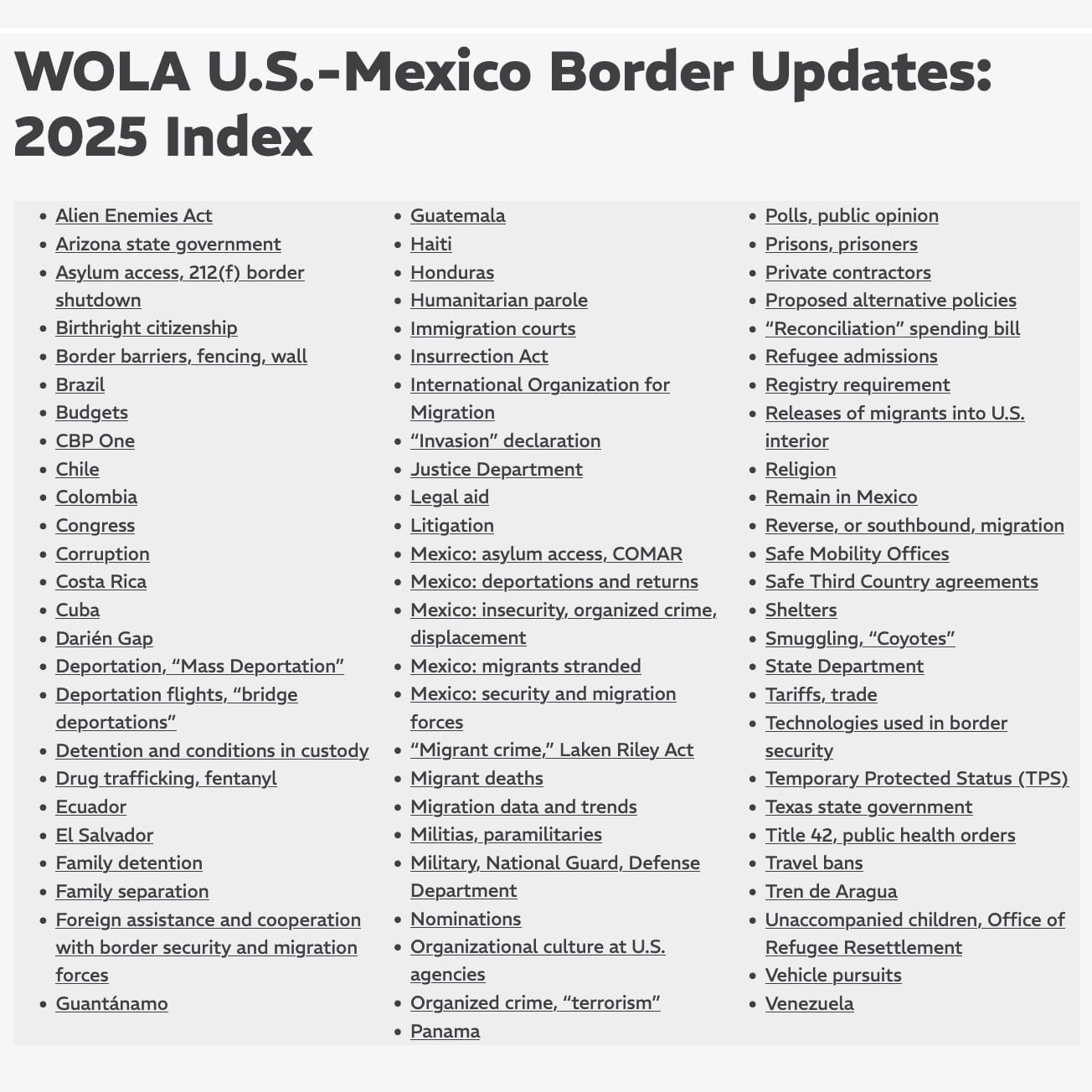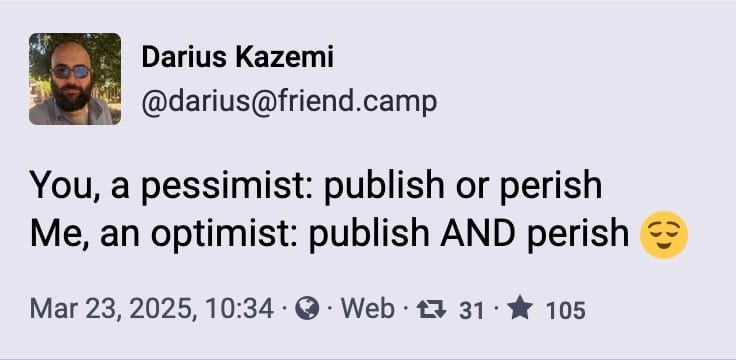Updates from Adam Isacson (March 23, 2025)
Hi, this is Adam. If you're receiving this message, it means you signed up on my website to receive regular updates. If you'd like to stop getting these, just follow the instructions further down.
It's only been five days since my last email, but there is a lot in this one. The administration's invocation of the Alien Enemies Act, a historic setback to human rights in the United States, was one of several serious developments we tried to cover last week. In addition to the stuff below and on social media, we contributed to stories in the Guardian, Salon (cited at USA Today), the El Paso Times, the Arizona Daily Star, and elsewhere.
My next email could be a bit late. I'll be testifying on Thursday in a House Foreign Affairs subcommittee hearing about the State Department's Bureau for Narcotics and Law Enforcement Affairs. (I'm not listed on the hearing page yet, but should be soon.) Preparing and delivering testimony usually takes 12-15 hours out of an already full week, so products like the Border Update and this email will have to slip back a few days.
This email has a link to the Border Update, a podcast about the Alien Enemies Act, two posts about some of the people who got sent to El Salvador’s terror prison, some links to recent coverage of Colombia’s peace process, a few shorter posts about border security and human rights, some readings from the past week, and links to upcoming events. (That's quite a bit for five days.) Stay well and thank you for reading.
Weekly U.S.-Mexico Border Update: The Alien Enemies Act, military buildup, border wall
- Read the whole thing here. See past weekly updates here. View a topic index of 2025's Border Updates here.
By the way, I don't include the full text of the Border Updates here because they're long, and have grown even longer since January 20. If you'd like a separate email with the exhaustively full text of the Border Updates, you can sign up to this Google Group.
THIS WEEK IN BRIEF:
- Invocation of Alien Enemies Act raises due process, democracy, and foreign relations concerns: The Trump administration has employed a 227-year-old law to expel hundreds of Venezuelan men to El Salvador’s feared prison system without due process and in likely defiance of a judicial order to divert the aircraft carrying them. As officials resist supplying a federal court with basic information about the incident, legal analysts warn of a constitutional crisis.
- U.S. military presence at the border continues to expand: The administration may be planning to declare a 60-foot buffer zone along much of the border to be a “military installation,” allowing soldiers to “hold” migrants there. A Navy destroyer is to carry out a mission where the border meets the Gulf of Mexico.
- Travel ban appears imminent: In a much larger version of a “travel ban” implemented during Donald Trump’s first term, his administration may soon ban the arrival of 43 countries’ citizens to the United States, dividing them into three tiers of prohibition.
- Border wall construction resuming: The administration is using funds appropriated in 2021 to build seven miles of border wall in south Texas, potentially including a segment running through a private butterfly reserve. “Gap-filling” projects are getting underway near Nogales, Arizona, and San Diego, California.
- Notes on Congress: Congressional Democrats issued letters protesting the administration’s renewed use of family detention and termination of Temporary Protected Status for Venezuelans. ICE is warning Congress of a $2 billion budget shortfall for fiscal 2025.
Support ad-free, paywall-free Weekly Border Updates. Your donation to WOLA is crucial to sustain this effort. Please contribute now and support our work.
WOLA U.S.-Mexico Border Updates: 2025 Index

These weekly Border Updates are getting incredibly high pageview numbers. I'm glad that an exercise that I began in 2020 really just "to force myself to do the reading" is useful for others, too.
But it's a lot to read, especially this year: just look at all of those topics. Even I, who drafted this stuff, can't always remember where and when I wrote about a particular topic.
So I've been taking this extra step of indexing each Update after posting it. This index for 2025 is worth bookmarking—I find myself visiting it 4-5 times per day now when I need to look something up.
WOLA Podcast: The Alien Enemies Act
Here’s a half-hour podcast with a slightly different format. Because it’s mostly about migration, which I work on at WOLA, I do most of the talking this time. WOLA, though, also has experts on Venezuela, Laura Dib, and El Salvador, Ana María Méndez Dardón, who answer some of my questions here.
Here is an unedited, AI-generated transcript. And here is the text of the podcast landing page on WOLA’s website:
On March 15, 2025, President Donald Trump invoked the Alien Enemies Act of 1798 for only the fourth time in U.S. history. The target, this time, is citizens of Venezuela. His administration sent hundreds out of the country, and into a Salvadoran prison, on mere suspicion of ties to a criminal organization, the Tren de Aragua.
In this explainer episode recorded on March 21, with help from WOLA’s Venezuela Director Laura Dib and Central America Director Ana María Méndez Dardón, Defense Oversight Director Adam Isacson walks through what has happened over the past six dark days in U.S. history.
- The Alien Enemies Act did not use any standard of due process, and many of those sent out of the country, it is now very apparent, were documented in the United States and were not guilty of anything. All it took was for U.S. agents to decide that they did not like the way these young men looked.
- The Trump administration ignored a clear order from a federal judge to turn the planes around and is now resisting that judge’s demands for information. The result is one of the most severe constitutional crises in U.S. history, which is unresolved as of March 21st.
- Rather than simply deport them, the planes took 238 citizens of Venezuela straight to El Salvador, where authoritarian leader Nayib Bukele took them straight to a notorious mega-prison where those inside are cut off from the outside world and never seem to emerge.
This alarming story is far from over, but this episode lays out some of the most pertinent facts and context in half an hour.
Download this podcast episode’s .mp3 file here. Listen to WOLA’s Latin America Today podcast on Apple Podcasts, Spotify, iHeartRadio, or wherever you subscribe to podcasts. The main feed is here.
Who Did the Trump Administration Just Send to El Salvador’s Dungeons?
On Thursday evening, while drafting the most recent Border Update, I took note of every case that was public at the time about someone whom ICE had arrested and sent to El Salvador's prisons, using the Alien Enemies Act, on what is looking like the thinnest of pretexts to impute gang membership.
After scouring news coverage and court filings, I found 15 names and narratives and gave each a brief writeup with links to sources.
While this appears in the Border Update, I did not want these young men's stories to be buried there, so I made this separate post and shared it on social media. The amount of pageviews and downloads that resulted is likely to cost me money in extra web hosting fees this month—but it was worth it. Here's the text
On March 20 CBS News obtained and published a full list of all 238 Venezuelan men whom the Trump administration sent to El Salvador on March 15, despite a judge’s orders. It appears that 137 had no due process at all—they were sent under the fourth-ever invocation of the Alien Enemies Act of 1798. The other 101 apparently had orders of removal.
But even though none committed any crimes in El Salvador, the government of Nayib Bukele sent them directly to the “Center for Confinement of Terrorism (CECOT),” a mega-jail built about two years ago to hold gang members, from which no prisoner is known to have been released.
For many of their loved ones, the CBS list was the first confirmation of their whereabouts. “Family members of the men say they’ve had no way to communicate with their loved ones,” noted Jonathan Lemire and Nick Miroff at the Atlantic, “So they study the [Salvadoran government’s] propaganda videos for glimpses of sons and spouses among the deportees.”
Here are profiles that I’ve seen of 15 of them, with links to sources. They really do not seem to be gang members at all.
- Gustavo Adolfo Aguilera Agüero, 27, had been living in Dallas with his wife since December 2023, when they entered the United States with a CBP One appointment. In early February 2025, Aguilera was arrested while taking out the trash outside their home, his wife told the Miami Herald. He has a nine-month-old U.S. citizen son. His tattoos include his older, Venezuelan-born son’s name, his name and his mother’s name, and a reggaeton lyric. His mother says he has no criminal record.
- ”JABV,” a 24-year-old who was abducted and beaten for carrying out campaign work on behalf of opposition leader María Corina Machado in 2024. His attorney stated that he has no criminal record in either the United States or Venezuela, no removal order, and “his tattoos are a Rose, a Clock and a Crown with his son’s name on it.”
- Franco Caraballo, a 26-year-old barber detained in Dallas on February 3 when he reported to a regular check-in with ICE. His wife, Johanny Sánchez, insists he has no gang ties. “She struggles even to find logic in the accusation,” the Associated Press reported. Caraballo has several tattoos, including an image of a clock commemorating his daughter’s birthday. He had called Ms. Sánchez on the evening of March 14, Reuters reported, to tell her that he was probably being deported to Venezuela even though he had a pending asylum claim.
- ”L.G.,” who has no removal order and a pending asylum claim. His attorney stated, “L.G. has three tattoos: one is a rosary, the other is his partner’s name, and the third is a rose and a clock.”
- Edwuar Hernández, a 23-year-old man from Maracaibo, was arrested along with three friends at the Dallas townhouse they shared on March 13. Relatives tell the Washington Post that he had no gang ties and no criminal record in Venezuela. (See the narrative for Mervyn Yamarte below.)
- Francisco Javier García Casique, a 24-year-old barber from Maracay, Venezuela, had a clean criminal record. He tried to make a living in Peru for four years before migrating to the United States. “He doesn’t belong to any criminal gang, either in the US or in Venezuela… he’s not a criminal,” his mother told the BBC. “My brother doesn’t belong to any criminal group, has no criminal history or record in any country and they have unjustly sent him to El Salvador simply because of his tattoos,” the Guardian reported that his brother wrote on Instagram.
- Ali David Navas Vizcaya, who was detained in early 2024 when appearing for an appointment with ICE. His mother told AP “he has no criminal record and suspects he may have been mistakenly identified as a Tren de Aragua member because of several tattoos.”
- Andy Javier Perozo, a 30-year-old father of five from Maracaibo who was doing food delivery gig work, was arrested along with three friends at the Dallas townhouse they shared on March 13. Relatives tell the Washington Post that he had no gang ties and no criminal record in Venezuela. (See the narrative for Mervyn Yamarte below.)
- Jerce Reyes Barrios, a 36-year-old former professional soccer player who was imprisoned and tortured after marching in two early-2024 demonstrations against the Maduro regime. Reyes has a tattoo of the Real Madrid soccer team’s logo and had a picture of himself in his social media feed making a rock-and-roll hand gesture that DHS officials decided was a gang sign. He had already submitted a document showing he had no criminal record and a declaration from the tattoo artist, to no avail. He has two daughters, aged two and six.
- Ringo Rincón, a 39-year-old man from Maracaibo, was arrested along with three friends at the Dallas townhouse they shared on March 13. Relatives tell the Washington Post that he had no gang ties and no criminal record in Venezuela. (See the narrative for Mervyn Yamarte below.)
- Anyelo Jose Sarabia, age 19, is an asylum seeker detained during a scheduled January 31, 2025 check-in with ICE in Dallas. His brother’s statement reads, “The tattoo on his left hand is of a rose with money as petals. A picture of the tattoo is below. He had that tattoo done in August 2024 in Arlington, Texas, because he thought it looked cool.” (His sister said something similar to Reuters.) Another tattoo is the words “strength and courage,” and another is a bible verse; both were applied by Anyelo’s brother, who has no criminal record in the United States or Venezuela.
- ”E.V.,” who fled Venezuela after being imprisoned and tortured for participating in a 2022 protest. His attorney said he “has only one arrest in the U.S., which resolved with a non-criminal disposition under New York state law and for which he received a sentence of a one-year conditional discharge.” He has “tattoos of anime, flowers, and animals.”
- Henry Javier Vargas Lugo, a 32-year-old, had been living and working odd jobs in Aurora, Colorado after trying to make a living as a mechanic in Colombia for seven years. He entered the United States with his mother and daughter. “He has several tattoos, including crowns with his niece and mother’s name, a clock on his arm and a rosary,” the Miami Herald reported.
- Mervyn Yamarte, a 29-year-old who entered the United States in 2023 after passing through the Darién Gap and lived in Dallas, is “‘a good, hardworking boy’ who had never been involved in crime,” his mother told the Guardian and the BBC. His wife said the same to the Washington Post, which reported that armed ICE officers showed up on March 13 at the townhouse where he and three friends from Maracaibo had been living, and hauled them away. Yamarte’s younger brother witnessed the arrest; he said that the agents asked whether he had tattoos. One of Mervyn Yamarte’s tattoos is his daughter’s name. Another reads, “strong like Mom.” Yamarte appears—shaved, wincing, but recognizable—in the video shared by Salvadoran President Nayib Bukele on March 16.
- An unnamed client of Lindsay Toczylowski, an attorney at the Los Angeles-based Immigrant Defenders Law Center (ImmDef), is an LGBTQ+ artist and asylum seeker whose tattoos included a verse from the Book of Isaiah. “They’re fairly benign. Clearly not gang tattoos,” Toczylowski told Mother Jones. “In my 15 years of representing people in removal proceedings in the United States, this is the most shocking thing that I’ve ever seen happen to one of our clients,” she told the Guardian.
Just a Monumental, Tragic, Stupid Screwup

Here are photos of some of the young Venezuelan men whom the Trump administration sent to El Salvador’s terror prison on Saturday. With no chance to defend their good name. On the merest suspicion of membership in a criminal group.
Their relatives say it’s all false. It’s looking like a monumental, tragic screwup. Get them out and at least give them a hearing.
The captions and sources, clockwise from top left:
- Mervin Jose Yamarte Fernandez, 29, is one of 238 Venezuelans accused by the Trump administration of gang affiliation and sent over the weekend to El Salvador’s Terrorist Confinement Center. His sister recognized him in a video shared on social media, where masked guards shaved the detainees’ heads and escorted them into cells at the maximum-security facility. As the camera panned across the scene, Yamarte slowly turned his gaze toward it. (Yamarte’s family / Miami Herald)
- Gustavo Adolfo Aguilera Agüero, 26, from the Venezuelan Andes in Táchira, had been living in Dallas with his wife since December 2023. In early February, Aguilera Agüero was detained by authorities while taking out the trash, according to his wife. Authorities were actually searching for someone else, but Aguilera Agüero spent several weeks in detention, awaiting deportation to Venezuela. Now, his mother, Miriam Aguilera, fears her son may be among the Venezuelans deported to El Salvador. (Aguilera’s family / Miami Herald)
- Franco Caraballo, 26, a Venezuelan migrant whose family believes he was sent from the United States to a prison in El Salvador, takes a selfie with his wife Johanny Sanchez, in this undated handout picture provided by his family. (Franco Caraballo’s Family/Handout via REUTERS)
- Henry Javier Vargas, 32, originally from Vargas state on Venezuela’s coast, had been living in Aurora, Colorado, for nearly a year when he was detained on January 29. Prior to migrating to the U.S., Vargas spent seven years in Colombia, working as a mechanic in Bogotá. Vargas’s family was able to identify him in a video posted by Salvadoran President Nayib Bukele, showing the detainees arriving in El Salvador. In the footage, his hands are shackled, and his head is bowed in a moment of despair (Vargas’s family / Miami Herald)
- Ringo Rincón was living in Dallas when he was arrested. His girlfriend says she believes he has been taken to a prison in El Salvador with his roommates. (Roslyany Caamaño / The Washington Post)
- Francisco García, a barber, with one of his customers. (Photo courtesy of Sebastián García / El Estímulo).
- Andy Javier Perozo with his mom, Erkia Palencia, and a note wishing her happy birthday. (Courtesy of Erkia Palencia / The Washington Post)
Colombia’s Peace Process: Some Links from the Past Month
Here are links to 12 stories from the past month about Colombia’s uneven efforts to achieve and consolidate peace. They’re presented according to three focus areas: the effects of the Trump administration’s policies, the politics of the “total peace” effort, and the implementation of the 2016 accord.
The effects of the Trump administration’s policies
- Alfie Pannell, “Colombia Had Been Receiving Up to $440 Million a Year From Usaid” (Reuters, Reuters, March 18, 2025).
In recent years, Colombia received as much as $440 million annually in USAID assistance for more than 80 programs
- Braeden Garrett, Clara Whitney, Tomasina Pearman, “Can Usaid’s Funding Freeze Put Colombia’s Peace Process at Risk?” (JusticeInfo, March 14, 2025).
The fragile peace process in Colombia is facing one of its biggest challenges since it was signed in 2016. The freezing of USAID (essential US funding), ordered by Trump and Musk, could paralyse justice as well as peace
- Santiago Torrado, “Los Estados Unidos de Trump se Atraviesan en la Paz Total de Petro” (El Pais (Spain), February 23, 2025).
Los pedidos de extradición de delegados de los grupos armados y las listas de organizaciones terroristas siembran de incertidumbre las mesas de negociación
The politics of the “total peace” effort
- “Zonas de Reserva Campesina: La Apuesta Clave en Mesa de Paz Con Disidencia de Calarca” (El Espectador (Colombia), March 17, 2025).
En el marco de la mesa de diálogo entre el Gobierno y las disidencia Estado Mayor de Bloques y Frente se han adelantado acciones en materia de titulación de tierras, creación de Zonas de Reserva Campesina, planes de educación y desarrollo sostenible. Este domingo las comunidades pidieron ampliar el cese al fuego bilateral con ese grupo
- “Asi Es la Lucha Contra la Deforestacion y los Estigmas de la Guerra en el Caguan” (El Espectador (Colombia), March 12, 2025).
En San Vicente del Caguán se llevó a cabo un diálogo social para identificar necesidades y propuestas de paz de los habitantantes
- “Gestion de Paz del Comisionado Patino Desperto Inquietudes en Gobierno y Regiones” (El Espectador (Colombia), March 10, 2025).
La gestión del comisionado de Paz generó dudas en el gobierno Petro. El funcionario defendió sus resultados. ¿Por qué?
- Eduardo Pizarro Leongomez, “La Paz Total y las “Gobernanzas Criminales”” (Razon Publica (Colombia), March 9, 2025).
Es urgente un profundo revolcón en el diseño y en la conducción de la política de paz o, de lo contrario, lo más probable es que el balance del gobierno Petro en este terreno termine siendo muy negativo
- Juanita León, Santiago Rodriguez Alvarez, “Petro Deja Sola la Paz Total” (La Silla Vacia (Colombia), March 3, 2025).
La captura de ‘Araña’ y las críticas de sus ministras son muestra de que el presidente está cada vez más lejos de esta bandera
- “Bajo Cauca, la Paz Total Entre Crimenes y Mineria Ilegal” (Voragine (Colombia), February 28, 2025).
La Paz Total del gobierno de Gustavo Petro aún no se refleja en el país y mucho menos en el Bajo Cauca. Mientras tanto, el Clan del Golfo se reestructura bajo el nombre de Ejército Gaitanista de Colombia, buscando reconocimiento político
The implementation of the 2016 accord
- Cecilia Orozco Tascón, “Magistrada Julieta Lemaitre: La Amnistia No se Aplica a Personas, Sino a Crimenes” (El Espectador (Colombia), March 2, 2025).
Afirma la magistrada de la JEP, de la Sala de Reconocimiento, que esta semana recomendó amnistiar algunos casos de secuestros de las Farc
- Camilo A. Castillo, “El Drama de Ex-Farc Que Salieron de Espacio de Reincorporacion por Violencia de las Disidencias” (El Tiempo (Colombia), February 26, 2025).
75 personas que abandonaron la NAR Simón Trinidad piden al Gobierno garantías para su reubicación
- Juan Pablo Contreras Rios, “‘los Esfuerzos No Parecen Ser Suficientes’: Representante de Onu Derechos Humanos” (El Espectador (Colombia), February 25, 2025).
Juan Carlos Monge, representante de la ONU Derechos Humanos, habló con Colombia+20 sobre reclutamiento, confinamiento y paz total.
DHS Shuts Down Its Own Oversight
The New York Times was the first to report yesterday that the Department of Homeland Security (DHS) is firing nearly all staff at, or shuttering, three internal oversight agencies: its Office for Civil Rights and Civil Liberties (CRCL), its Citizenship and Immigration Services Ombudsman, and its Immigration Detention Ombudsman (OIDO).
It shouldn’t be this easy for one of the world’s largest law enforcement agencies, DHS, to obliterate its internal oversight. In fact, it isn’t, at least in the case of CRCL, read a March 13 letter from the ranking Democrats on the Senate Homeland Security and Judiciary Committees, Sen. Gary Peters (D-Michigan) and Sen. Dick Durbin (D-Illinois):
The DHS Civil Rights and Civil Liberties (CRCL) Office is fulfilling statutorily- required missions, and the CRCL Officer is a statutorily-required position that the Secretary must fully support with sufficient personnel and resources.
It appears that the Trump DHS is trying to get around this by keeping the position of the CRCL officer, but eliminating that officer’s staff and reassigning duties to less-empowered individuals elsewhere in the Department.
At WOLA we’d published criticisms of DHS Civil Rights/Civil Liberties for slowness, unresponsiveness, and a lack of “teeth” to improve abusive behavior. But as bad encounters with DHS personnel grow more likely, we’re all going to miss DHS CRCL when it is gone.
New York Times and other coverage of the mass firings, meanwhile, includes this chilling quote from Tricia McLaughlin, DHS’s new assistant secretary for public affairs, who is a regular source of chilling quotes.
Tricia McLaughlin, a spokeswoman for the Homeland Security Department, said the decision was meant to “streamline oversight to remove roadblocks to enforcement.”
“These offices have obstructed immigration enforcement by adding bureaucratic hurdles and undermining D.H.S.’s mission,” Ms. McLaughlin said. “Rather than supporting law enforcement efforts, they often function as internal adversaries that slow down operations.”
In Latin America we’ve often seen quotes like this one from autocratic leaders and security forces. Defining basic oversight as adversarial or aligned with enemies.
This was constant In Colombia, where I worked a lot in the 90s and 00s. Álvaro Uribe even called human rights defenders “spokespeople for terrorism” while military-aligned paramilitaries were massacring communities and military “false positive” killings were worsening. Today, Colombians are still counting the dead.
Saving Private… Who Exactly?

U.S. Northern Command announced that the Navy has sent an Arleigh Burke-class guided-missile destroyer—which “can carry 96 missiles, including Tomahawk Land Attack cruise missiles”—to the point where the US-Mexico border hits the Gulf of Mexico.
At Stars and Stripes (which shamefully called the body of water the “Gulf of America”), Adm. Daryl Caudle, commander of U.S. Fleet Forces, very diplomatically said that it’s not really clear what the U.S.S. Gravely—a ship that until recently was shooting down Houthi missiles and drones in Yemen—might end up doing along the border.
“It is a bit unique to deploy a capability of this level for this mission set, but I think it goes to the commitment the Navy has to the president and the secretary of defense to support the southern border operations,” Caudle said.
One thing is for sure. For now at least, migrants can forget about landing their tank battalions, Normandy-style, on Texas beaches.
Plainclothes Border Patrol… in Southeast Washington
This video obtained by the Washington Post shows a Border Patrol agent arresting a Venezuelan father whose only crime was improperly crossing the border in October 2022 when he, his wife, and kids turned themselves in to ask for asylum.
You can’t tell the arresting officer is a Border Patrol agent because he’s wearing a sweatshirt featuring a gothic font popular with Salvadoran gangs. You’ll also be surprised that he’s a Border Patrol agent because the arrest happened in southeast Washington DC, far from an international border. (Because Washington is within 100 miles of a U.S. coastline, it is still an area where Border Patrol is allowed to operate.)

It’s also nearly unprecedented to see a Temporary Protected Status (TPS) holder arrested for “improper entry” more than two years ago. We’re in a new and scary era.
The arrested father and mother are currently free, thanks to the quick and aggressive action of attorneys and mutual aid networks.
Links from the Past Week
- Patrick J. McDonnell, Families flock to Mexican murder ranch, hoping for signs of loved ones (The Los Angeles Times, Friday, March 21, 2025).
For relatives of the missing, the barren site outside Teuchitlán has become a pilgrimage site, a place to pay respects to those lost
- Charlie Savage, Julian E. Barnes, In Deportations, Trump Tied Gang to Venezuela's Government. Intelligence Contradicts Him. (The New York Times, Thursday, March 20, 2025).
To invoke wartime deportation powers, President Trump asserted that Venezuela’s government controls a gang. U.S. intelligence analysts think that is not true
- Adam Liptak, Defiance and Threats in Deportation Case Renew Fear of Constitutional Crisis (The New York Times, Wednesday, March 19, 2025).
Legal scholars say that the nation has reached a tipping point and that the right question is not whether there is a crisis, but rather how much damage it will cause
- David Noriega, Sarah Ford, The Truth About Tren de Aragua, the Gang at the Center of Trump's Immigration Crackdown (NBC News, Tuesday, March 18, 2025).
The Trump administration says the group should be treated as an invading force. Critics say it’s a pretext for the administration’s anti-immigrant narrative
- Caitlyn Yates, Stephanie Leutert, Asylum Processing at the U.S.-Mexico Border: February 2025 (University of Texas Strauss Center, Monday, March 17, 2025).
This February 2025 asylum processing update focuses on current U.S. asylum policies at ports of entry and migrants’ experiences in Mexican border cities. As of January 20, 2025, there is no longer any asylum processing at the border
Latin America-Related Events in Washington and Online This Week
(Events that I know of, anyway. All times are U.S. Eastern.)
Monday, March 24
- 2:00 at Zoom: What are the threats unaccompanied kids face? (RSVP required).
Tuesday, March 25
- 10:00-11:00 at thedialogue.org: Launch of the Regional Repository of Chinese Investments in Latin America (RSVP required).
- 10:00-1:00 at Room 310 Cannon House Office Building and online: Hearing of the House Homeland Subcommittee on Border Security and Enforcement on Part 1: Consequences of Failure: How Biden’s Policies Fueled the Border Crisis.
- 8:00-9:30pm at wilsoncenter.org: Políticas de seguridad y narcotráfico en América Latina: ¿hacia dónde vamos?
Wednesday, March 26
- 11:00 at atlanticcouncil.org: Evaluating the US-Colombia commercial relationship (RSVP required).
- 5:00 at CINEP YouTube: Lanzamiento Virtual de la Base de Datos DataPaz.
Thursday, March 27
- 9:30 at Room 2172, Rayburn House Office Building: Hearing of the House Foreign Affairs Western Hemisphere Subcommittee on INL Should Fight Crime, Not Fight Conservatives.
And Finally



